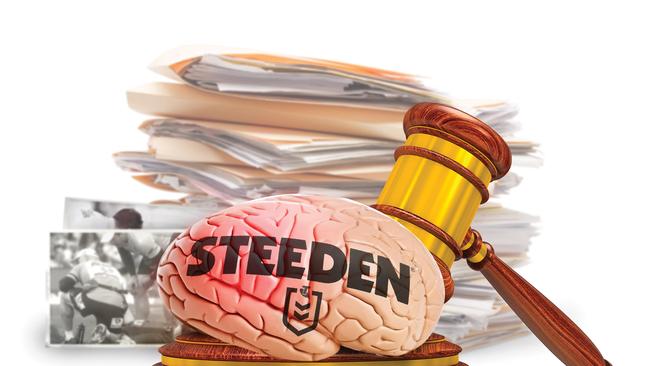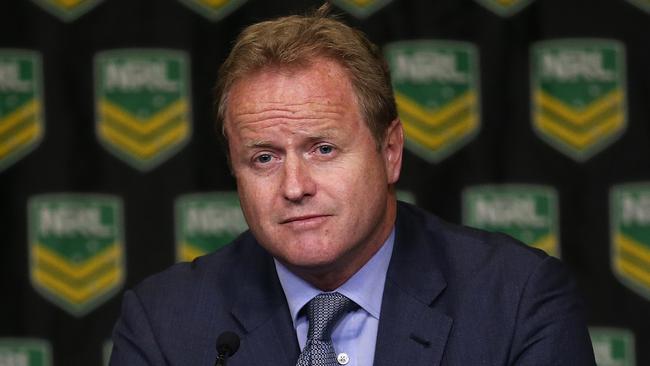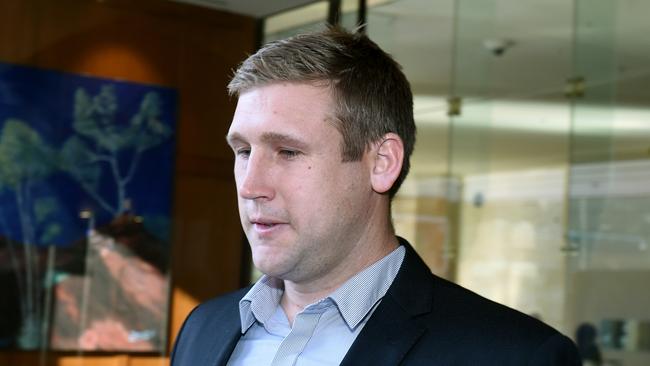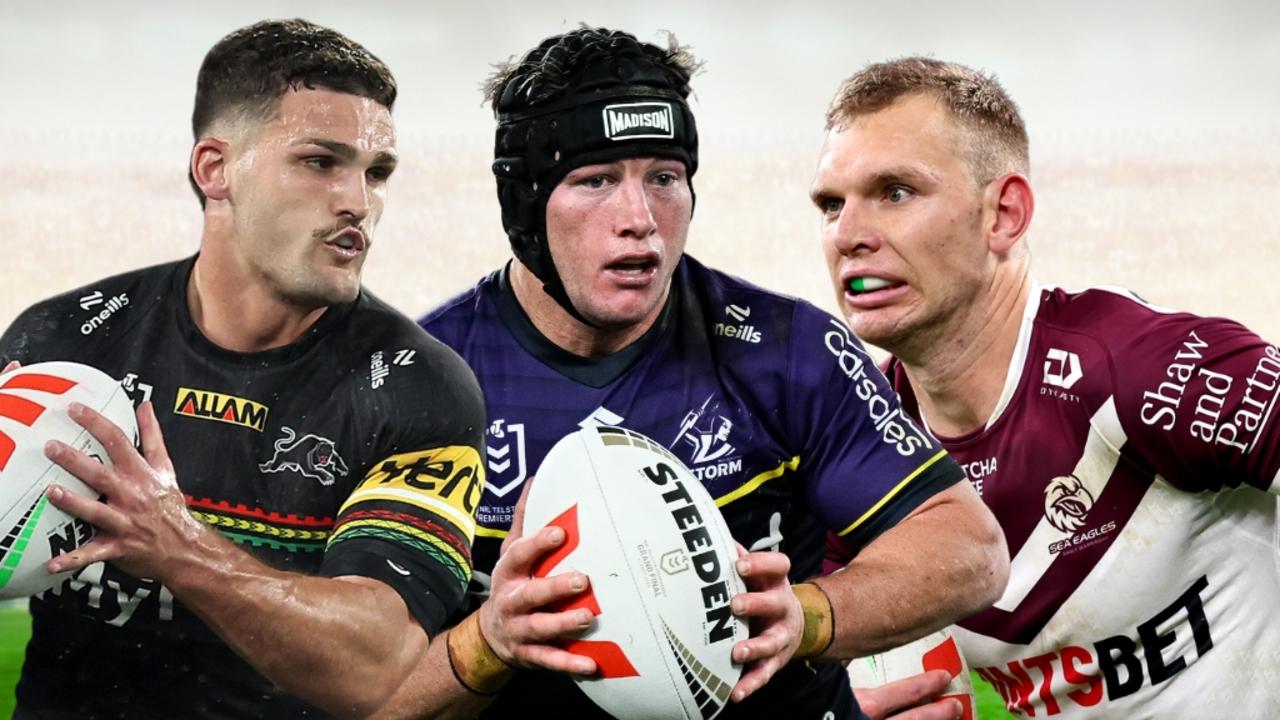NRL 2021: Lawyers working on class action over concussion | Paul Kent
From a coffee shop on Castlereagh St, the first tremor ran through the NRL. Paul Kent takes you inside the concussion lawsuit which could cripple the game.

NRL
Don't miss out on the headlines from NRL. Followed categories will be added to My News.
The earthquakes that bring down cities begin with a mere tremor and so, on Thursday, in a small coffee shop on Castlereagh St, the first tremor ran through the NRL.
A class action to sue the NRL over concussions is being planned and nothing will be the same again.
“We need 50 people,” Barry Tilley is saying.
Tilley is a Sydney property manager and businessman, a former friend of Kerry Packer. At the coffee table beside him is a former first-grade footballer from the 1980s whose talent was limitless before injury shortened his career.
He became one of those what-could-have-been players.
For weeks they have been talking about challenging the NRL in a court case that could cripple the game, the conversations frequent enough that small whispers have begun to spread into something bigger.
It seems it is an uncomfortable conversation for everybody but the lawyers.
Stream selected Fox League shows on Kayo Freebies completely free this June including NRL 360, Sunday Night with Matty Johns, Big League Wrap & more. No Credit Card. No-brainer. Register Free Now >

Tilley is speaking for Mitry Lawyers, who are in a nearby office and in the early stages of setting up a class action involving as many former players as they can assemble.
The search continues for more players – even for a layman it’s obvious that more players means more money.
“I don’t know,” the former player said. “Do other people have these same struggles in life? I think about my short-term memory. I’ll have two asterisks I want to get to and I’ll get the first one out and then get to the second one and I’ll be completely blank.”
That raises the pertinent question. Now in his late 50s, is his memory loss attributable to the concussions he endured as a player or is it a normal part of ageing?
He doesn’t know.
Tilley is unequivocal. “They haven’t had any decent rules to protect the people that play it,” he said.
It is a matter of judgment. Head-high tackles have been outlawed in the game since Dally Messenger scored his first try. Accidents would be included, you believe, under the inherent risk a player accepts by the act of running on to the field.
Somewhere in there, though, is that clouded area of the past when players were concussed and the zambuck would splash a cold sponge on their face and then drag them to their feet and point them back towards battle.
There was a masculine pride in that. It was a concession of weakness to be replaced, so when a player was knocked out in the game all that could be done to repair him and return him was done. Still, many players are uncomfortable taking action against the game.
The player has spoken to several former teammates and rivals with mixed responses. “Some just can’t bring it in themselves to do it,” he said. “They love their club.”
Slowly, though, the numbers have been increasing.
“There has been about 15 people talk to me about it and I told them the position and I have been straight upfront with them,” Rick Mitry, a partner at Mitry Lawyers, said.
He said the problem he found with players was that, even as the process began their memory was abandoning them, making it more difficult as it went on. The deeper the damage, the less help there was.
Many of his phone calls are from wives and children asking for help, their husband or father incapable of helping themselves anymore.
Many still capable of speaking for themselves remain reluctant.
“A lot are worried about the media,” Mitry said, refusing to name them. “I’m not going to leave them high and dry.”
To launch a successful class action, the lawyers first need 50 aggrieved ex-footballers. It is proving more difficult than they thought but they know they have time on their side.
Soon, they know that 15 will become 20 and then 30. Those already involved are calling former teammates and directing them to Mitry Lawyers.

The NRL has no idea the class action is being planned but has accepted it was inevitable. Since the game introduced concussion protocols under former chief executive Dave Smith, the potential for a class action has been one the NRL is waiting for. Mostly because a billion-dollar lawsuit was settled in the players’ favour in the NFL.
The comparison with America’s NFL is easily made but misleading.
The NFL was forced to pay $1bn in compensation and many have said they believe that easily translates to an NRL payout. After all, legally it would seem a concussion from being tackled in one game is no different from a concussion from being tackled in another.
It is not so simple. A significant part of the costs against the NFL was for behaviour as disgraceful as any ever seen.
With evidence emerging that concussions were contributing to this newly found chronic traumatic encephalopathy – the condition of protein deposits on the brain that bring on early-onset dementia – the NFL went into denial instead of accepting the new medical evidence.
The NFL picked up the tobacco industry’s playbook and financed misleading and inaccurate information in popular media and even in medical journals, declaring there was no evidence of a connection.
The players, angered by their deceit, attacked with lawyers.

The NRL has not been negligent in that manner, introducing safety protocols as quickly as the latest information was available.
Further, legal advice from the NRL is that a class action would not be successful because there are so many differing factors that can contribute to dementia, such as alcohol intake, drug use and genetic disposition.
The NRL’s advice is that every player would have to sue individually given the range of possibilities in each case. Its position was strengthened this month when former Melbourne prop Michael Greenfield lost a Supreme Court case against the Australian Rugby League Commission. Greenfield argued for negligence and/or breach of duty of care when the NRL banned the shoulder charge six months after a shoulder charge ended his career.
For many, it is an uneasy path given all they really want is assistance in their old age. There was a time when Men Of League was the place players went to for help, but changes to that organisation in recent years have made it too difficult, which is to the game’s great shame. A similar fund, but operated by the NRL, is not out of the question.
The players considering legal action say all they want is to be looked after as they grow frail – nothing scares old men more than being vulnerable.





